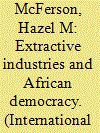| Srl | Item |
| 1 |
ID:
100196


|
|
|
|
|
| Publication |
2010.
|
| Summary/Abstract |
y the well-known "resource curse," the abundance of oil and other valuable minerals has been associated with patrimonialism and repression-in Africa and elsewhere. This article demonstrates a self-sustaining dynamic: lack of accountability enables elite appropriation of resources which in turn raises the monetary value of political control and finances continued repression. Several initiatives have been taken in recent years to foster transparency in mineral production and revenue, but with marginal impact. Lifting the curse requires a robust global effort to discourage "plunder oil." This is unlikely as long as the benefits of cheap oil to the importing countries outweigh the costs to the population of the exporting countries. The oil addiction of developed and emerging economies remains an oil malediction for African democracy. But launching a sustained international debate could eventually bear fruit.
|
|
|
|
|
|
|
|
|
|
|
|
|
|
|
|
| 2 |
ID:
092936


|
|
|
|
|
| Publication |
2009.
|
| Summary/Abstract |
Official corruption is frequently associated with the abundance of valuable extractive resources. This article reviews the worst cases of 'resource curse' in Africa-Angola, Republic of Congo, Democratic Republic of Congo, Equatorial Guinea, Gabon, and Nigeria-in light of the most recent developments. Despite its systematic association with public corruption, however, mineral wealth is neither a necessary nor a sufficient condition. Corruption is widespread in resource-poor countries as well-in Africa and elsewhere-and some resource-rich African countries such as Botswana have a record of good economic performance and high public integrity, suggesting specific ways in which transparency and accountability for the use of mineral resources can be encouraged and corruption correspondingly reduced. Because corruption in resource-rich African countries is heavily influenced by external interests, particularly the multinational extractive industries, recent initiatives by the United States and the international community to foster transparency carry a significant potential for reducing corruption and improving governance.
|
|
|
|
|
|
|
|
|
|
|
|
|
|
|
|